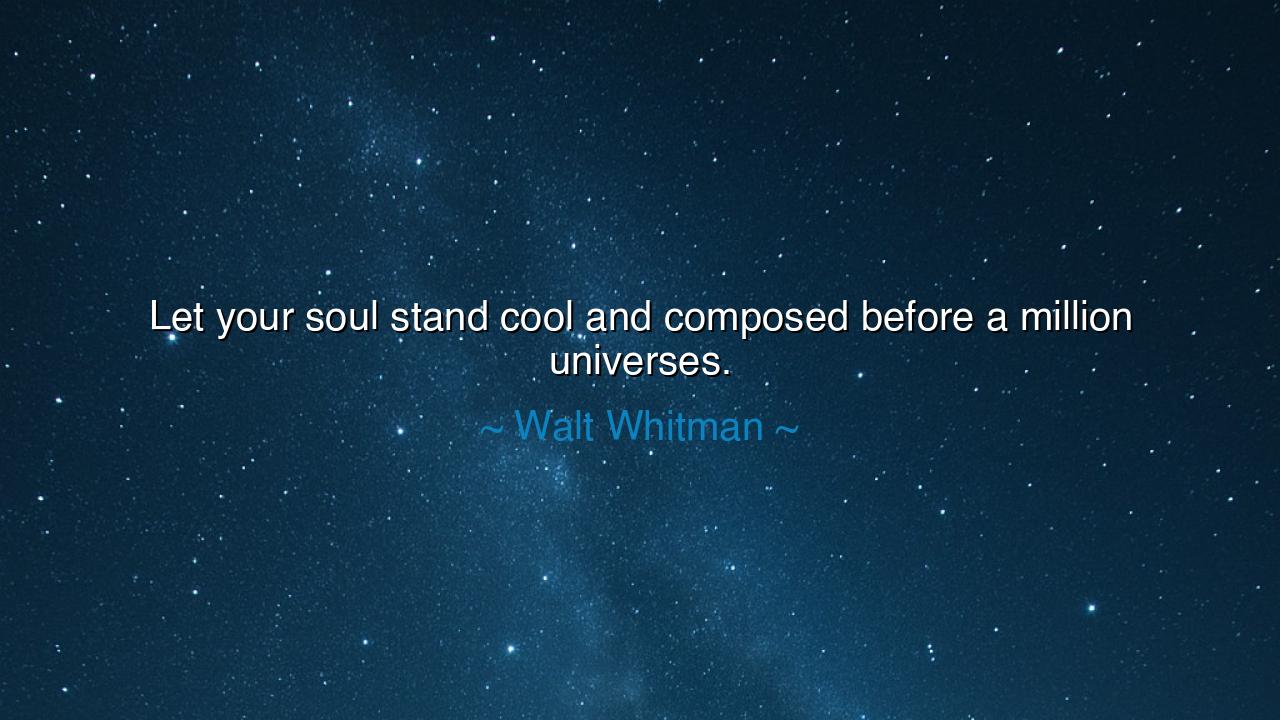
Let your soul stand cool and composed before a million universes.






In the profound words of Walt Whitman, "Let your soul stand cool and composed before a million universes," we are invited to consider the vastness of existence and the steadiness required to face it. Whitman, in his characteristic depth and insight, calls upon us to cultivate a soul that remains calm, poised, and unshaken, even in the face of the boundless complexity of life. To stand "cool and composed" before the vastness of the universe—a cosmos filled with countless uncertainties, challenges, and wonders—is a task that requires the highest form of inner strength and self-mastery. It speaks to the stillness we must learn to embrace, even as we navigate the unpredictable tides of existence.
This idea echoes the wisdom of the ancient Stoics, who taught that the true measure of a person's character is found in their ability to remain calm amidst chaos. Marcus Aurelius, the Roman emperor and Stoic philosopher, frequently wrote about the importance of maintaining a serene mind in the face of life's inevitable struggles. He understood that while we cannot control the universe, we can control our responses to it. To face the "million universes" of our own lives—full of distractions, pressures, and adversities—requires the discipline to stand anchored in our own truth. Just as Whitman suggests, we must find that inner composure, that inner peace, which allows us to witness the vastness of the world without being swept away by it.
Consider the life of Socrates, the great philosopher who, despite his humble appearance and modest means, remained unshaken in his pursuit of truth. He was condemned to death for challenging the established norms of Athenian society, yet he faced his fate with remarkable composure, refusing to succumb to fear or regret. In the moments before his execution, Socrates famously said, "The unexamined life is not worth living," showing that he had reconciled himself with the vastness of the world—its uncertainties, its suffering, and its truths—and had found peace in following his philosophical path. Socrates stood before the "universe" of his time with clarity, unwavering in his commitment to truth.
Similarly, the legendary Mahatma Gandhi was a figure who embodied this calmness in the face of overwhelming odds. Leading India to independence through nonviolent resistance, Gandhi faced the brutality of British colonial rule with an unwavering inner strength. His ability to remain composed before the immense injustice and suffering he witnessed is akin to Whitman’s vision of the soul standing cool before the vast, unpredictable universe. Gandhi's path was not easy—he endured imprisonment, fasting, and the loss of his loved ones—but he found peace in the certainty of his mission and the knowledge that his actions were aligned with his deepest values. Gandhi’s life teaches us that true strength comes not from external circumstances, but from the ability to remain steadfast in our convictions, no matter the size of the forces working against us.
In the world of art, the struggle to maintain composure amidst the pressures of public opinion is a timeless one. Vincent van Gogh, despite his immense passion for painting, faced immense rejection and personal torment. Yet, he remained dedicated to his craft, producing masterpieces like Starry Night in the face of poverty, mental illness, and isolation. Van Gogh’s journey was one of resilience, standing cool and composed before the emotional and mental storms that threatened to overwhelm him. His works, though misunderstood in his time, stand as a testament to the power of maintaining inner composure, even in the face of the universe’s most difficult trials.
Whitman’s words urge us to adopt a similar steadfastness in our own lives. We all face our own "million universes"—the swirling forces of doubt, fear, and chaos that can overwhelm us. The lesson here is not to avoid these forces, but to develop the inner composure that allows us to navigate them with clarity and purpose. Just as the ancient philosophers and modern heroes like Gandhi or van Gogh embraced their destinies with unwavering courage, so too must we find the stillness within ourselves to face the challenges of life with dignity and resolve.
The practical action we must take is this: cultivate a life of mindfulness and reflection. Take time to stand still in the face of life’s storms and focus on your inner peace. Whether through meditation, self-examination, or simply the act of deep breathing, create space within yourself to respond to the world from a place of calm. Embrace the unpredictability of life, and trust that by remaining composed, you will find clarity amidst confusion. To live with the coolness and composure Whitman describes is to live with purpose, to embrace the challenges of the world while remaining anchored in your own truth. Let your soul stand cool and composed, for it is in this stillness that you will find the strength to navigate the complexities of existence.






AAdministratorAdministrator
Welcome, honored guests. Please leave a comment, we will respond soon